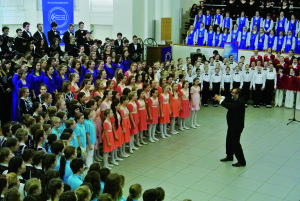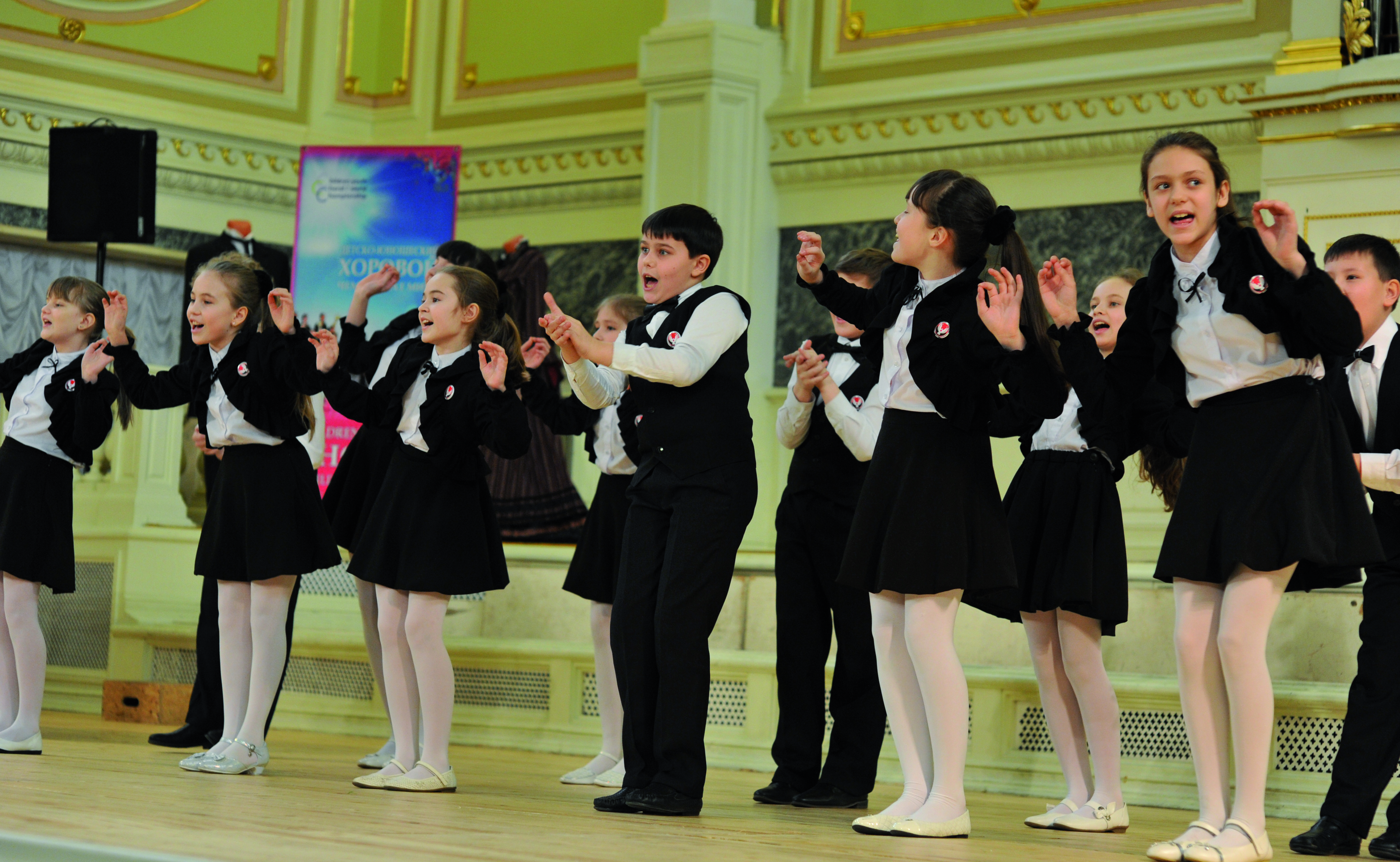Par Romans Vanags, Assistant à l’Académie de Musique Lettonne J. Vitols et Directeur artistique d’Interkultur.
À travers le monde des concours et festivals choraux ont lieu chaque année, presque chaque mois, et souvent il est difficile pour les chœurs et leurs chefs de choisir où aller. Certains chœurs choisissent ce qu’on appelle le tourisme culturel et vont à des endroits du monde où ils ne sont jamais allés auparavant, certains chœurs cherchent la rencontre avec des chœurs de haut niveau là où le concours est le plus acharné, tandis que d’autres, au contraire, se recherchent des conditions de concours plus les pieds sur terre en termes de composition des chœurs, de conditions d’accès et de règlement. Pour assurer la qualité du concours et le nombre de participants, les organisateurs doivent s’efforcer d’être à la recherche de nouvelles formes de contenus, d’organiser un concours choral qui tranche avec les autres par quelque chose de particulier. Le “Championnat mondial de chorales d’enfants et de jeunes”, organisé par l’agence culturelle de Saint-Pétersbourg InterAspect en collaboration avec l’Université Pédagogique Russe d’État Herzen est le “fruit” de la recherche de dispositifs nouveaux. Par définition, le concours est destiné à certaines catégories de chœurs avec une limite d’âge qui conditionne grandement la liste des concurrents et les règles du concours. En soi, la formule est intéressante. Comme en sport, les chœurs concourent en huitième de finale, en quart de finale, en demi-finale et seuls les meilleurs sont conviés pour les finales. Indubitablement, cela maintient le suspense et un véritable esprit de compétition. Comme dans les “Jeux choraux mondiaux” organisés par Interkultur, la lutte pour le titre de champion est très acharnée, et par ce biais les chœurs les plus puissants, les plus forts techniquement et musicalement, sont sélectionnés pour les finales.

Cette année, le 2ème Championnat mondial de chorales d’enfants et de jeunes de Saint-Pétersbourg a eu lieu du 15 au 22 février et a réuni 30 chœurs, essentiellement de Russie et d’Europe de l’Est. Cela se comprend : la situation géopolitique actuelle n’est pas très favorable aux organisateurs d’un festival artistique et culturel de grande ampleur dans cette région. Néanmoins, je tiens à féliciter chaleureusement les organisateurs du concours, en particulier Elena Brizina et Igor Matjukov pour leur tournure d’esprit à la fois très professionnelle et sincère. Toutes les parties du concours étaient très rigoureusement planifiées, et les prestations chorales ont suscité au sein du public un grand intérêt. La qualité et l’objectivité étaient aussi assurées par le jury international présidé par l’assistant du Conservatoire N. Rimsky-Korsakov de Saint-Pétersbourg, compositeur et chef Sergei Jekimov. J’ai eu le grand plaisir de travailler avec mes collègues Andrea Angelini (Italie), Milan Kolena (Slovaquie), Vytautas Miskinis (Lituanie) et Valeri Uspenski (Russie). Chacun de ces experts est bien connu des choristes et chefs de chœurs à travers le monde. J’espère vraiment que tant les notes de ces experts que les propos d’après concours ont apporté quelque chose aux chœurs et à leurs chefs. Chaque épreuve a eu ses leaders propres, parfois des chœurs dont la prestation fut une agréable surprise. Le leader de ce championnat, pratiquement dès le premier jours du concours, fut le Chœur d’Étudiants du Conservatoire N. Rimsky-Korsakov de Saint-Pétersbourg et son chef Anton Maksimov. La prestation de ce chœur dans la dernière ligne droite, la finale, fut particulièrement éclatante. Les capacités vocales et techniques du chœur, et l’entraînement professionnel des chanteurs, ont conditionné les résultats et amplement confirmé le haut niveau éducatif du Conservatoire. Après le concours, le jury s’est demandé si de tels chœurs scolaires et universitaires ne devraient pas avoir une catégorie propre plutôt que de concourir dans le même groupe que des chœurs qui ne possèdent pas une telle expérience musicale, les chances de ces derniers étant gravement obérées. De telles qualités artistiques dans le concours furent démontrées aussi par le chœur letton Daugavpils de l’École de Musique Stanislas Brok (chef : Yvgeny Ustinskov) et le Chœur d’Enfants de l’École de Musique Simferopol (chef : Viktor Zaslavskiy). Le Chœur d’enfants “Avrora” de Moscou, dirigé par Anastasia Belajeva, séduisit par sa sonorité claire, mais le chœur de Saint-Pétersbourg “Petersburg Stars”, dirigé par Svetlana Galimova, reçut de l’auditoire un accueil particulier. Ce chœur, dans lequel chantent des enfants déficients visuels, fournit une prestation délicieusement charmante et harmonieuse.

La formule de ce championnat imposait aux chefs une tâche difficile : établir le programme correctement du point de vue tactique, pour être à même d’améliorer les prestations au fil des séances suivantes, tant techniquement qu’artistiquement. Les chœurs qui avaient choisi un programme approprié furent capables de maintenir l’intérêt du public et du jury jusqu’aux finales du concours. Ce fut très sympa que les organisateurs donnent aux chœurs l’occasion de se produire dans les salles de concert les plus réputées et acoustiquement appropriées de Saint-Pétersbourg : la grande salle du Conservatoire N. Rimsky-Korsakov de Saint-Pétersbourg et la Chapelle de l’Académie d’État M. Glinka. Ces salles de concert, dans lesquelles se sont produits les interprètes les plus brillants du monde, resteront dans la mémoire tant des chefs que des choristes. Chaque chœur disposait aussi de la faculté de donner, en cours de festival, des concerts indépendants. Les participants avaient la possibilité de donner un concert dans une des plus fameuses églises de Russie: Spas na Krovy (Église du Sang Versé du Sauveur).
Les organisateurs avaient tout planifié très soigneusement : chaque chœur était coté et récompensé par des diplômes commémoratifs et des prix. Jusqu’à présent je n’avais jamais vu, lors d’un concours, autant de supporters qui voulaient récompenser leurs favoris par des prix spéciaux de sympathie. Lors de la cérémonie de clôture, chaque chœur se sentait gagnant; les yeux et les cœurs des enfants étaient remplis de joie !
En résumé, je tiens à affirmer que de tels concours choraux sont pour la croissance de chaque chœur un important point de départ et une affirmation de soi-même pour les jeunes chanteurs. Je souhaite que les organisateurs du Concours choral de Saint-Pétersbourg n’arrêtent pas en chemin et restent toujours créatifs, promoteurs d’idées neuves. Le plus important, maintenant dans le futur proche de ce concours, c’est d’attirer des chœurs venant de régions de plus en plus éloignées, créant donc un esprit de concours choral mondial. J’espère que la paix dans le monde gagnera, et ce festival musical de chœurs d’enfants et de jeunes venant et chantant ensemble contribuera à cette victoire !
Romans Vanags est diplômé du collège spécialisé en musique Emil Darzin du Département de Direction d’Orchestre et de Chœur du Conservatoire d’État Letton Jazep Vitol de Riga (actuellement intitulé Académie Lettonne de Musique Vitol). Il a obtenu des diplômes tant de direction chorale que pédagogie musicale. De plus, il a aussi étudié la direction d’orchestre symphonique. En 2003 il a obtenu un master professionnel en musique. Romans Vanags a été le chef principal du chœur de professeurs Vanema pendant des années (1984-2004) et depuis 1990 il est chef principal et directeur artistique du Chœur de Garçons de l’École de Musique Jazep Medinš. En 1990-1993 il a travaillé avec l’Orchestre Symphonique du Collège de Musique Jasep Medinš. Depuis 1987, Romans Vanags travaille comme professeur de direction chorale à l’Académie de Musique Lettonne à Riga. Courriel: romans@latnet.lv
Traduit de l’anglais par Jean Payon (Belgique)

